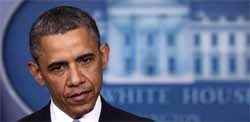Politics
Despite claims of limited strikes, Obama seeks broad mandate
 President Barack Obama has consistently told Congress and the American people any military strike launched against Syria will be over strictly limited nature and will not involve America in a wider conflict. However, his proposed authorization of force he is seeking from Congress appears to contradict his earlier statements by asking for a much broader authority.
President Barack Obama has consistently told Congress and the American people any military strike launched against Syria will be over strictly limited nature and will not involve America in a wider conflict. However, his proposed authorization of force he is seeking from Congress appears to contradict his earlier statements by asking for a much broader authority.
The main part of Obama’s proposed authorization for the use of military force provided to congressional leaders over the weekend contains 172 words, which is significantly more than 1964 Tonkin Gulf resolution that authorized the Vietnam War or the 2001 resolution authorizing retaliation for 9/11 terror attacks.
The proposal submitted by Obama if passed, would give him the go-ahead to use the military however he “determines to be necessary and appropriate in connection with the use of chemical weapons or other weapons of mass destruction in the conflict in Syria.” Specifically, the president could act to “prevent or deter the use or proliferation” of the weapons or to “protect the United States and its allies and partners” from the weapons.”
The resolution is also raised eyebrows for the fact that despite Obama claiming it to be a limited military action; the resolution has no sunset date.
University of Texas Law School Professor Robert Chesney said in an interview that “if the administration is serious about wanting to act in such a truly narrow, time-limited way,” then a sunset measure could be useful.
“These details may not matter much if all the president intends is a modest shot across the bow, as he suggested a few days ago,” said George Mason University School of Law Professor Ilya Somin Sunday. “But they could be significant if U.S. military intervention goes beyond that – including if it ends up expanding farther than the president may have originally intended.”
While having Congress pass a resolution would meet the requirements of domestic US law under the War Powers Resolution, Obama faces another issue and that is the resolution does not necessarily address international legal requirements.
“Unfortunately, the president’s draft (authorization) states a violation of international law in every line,” said Mary Ellen O’Connell, a University of Notre Dame law professor. “Resort to military force is not permitted to punish the use of banned weapons; to address arms proliferation, or to respond to vague threats to the United States.”
National self-defense or actions explicitly authorized by the United Nations’ Security Council are the only two kinds of military action acceptable under international law, O’Connell explained.
The administration has refused to specifically state whether it would still deploy the use of force even if Congress were to reject the resolution. Secretary of State John Kerry has stated several times that the president has inherent power to act in the nation self-defense.
“He has the right to do that no matter what Congress does,” Kerry said on CNN’s State of the Union program. “But the President believes, and I hope we will prove to the world, that we are stronger as a nation, our democracy is stronger when we respect the rights of the Congress to also weigh in on this.”






